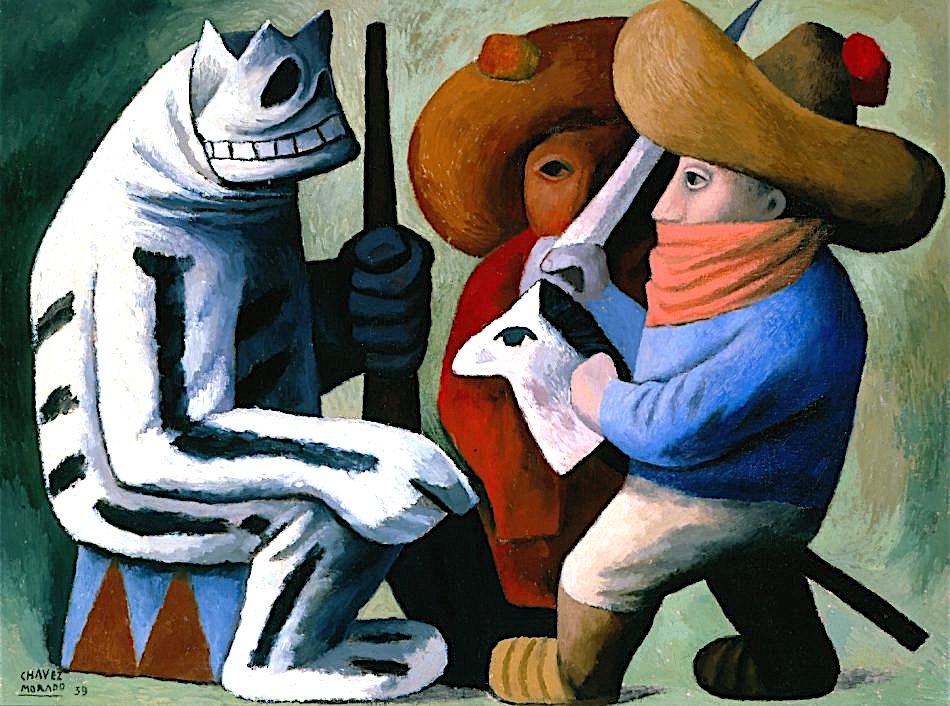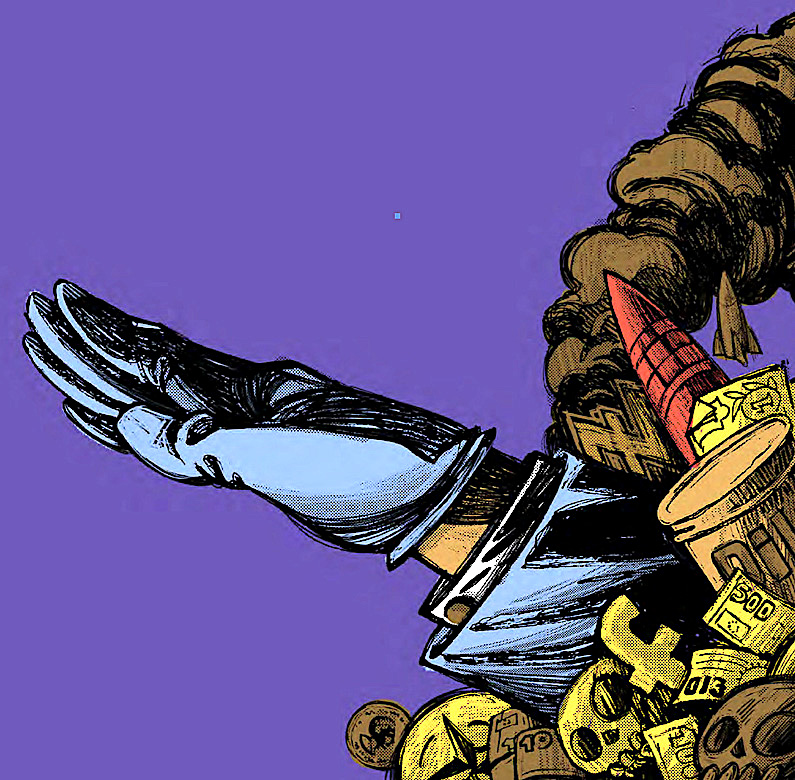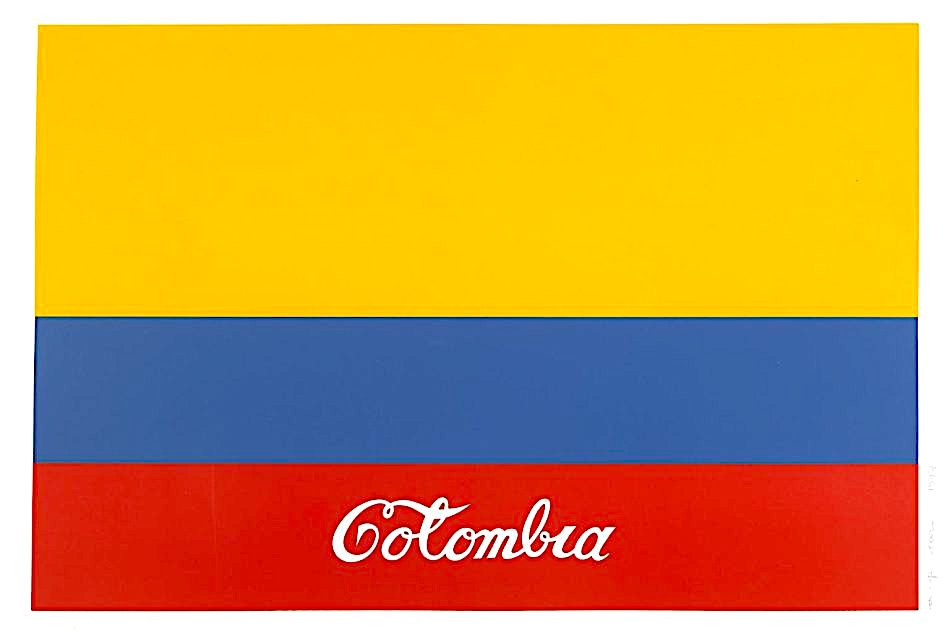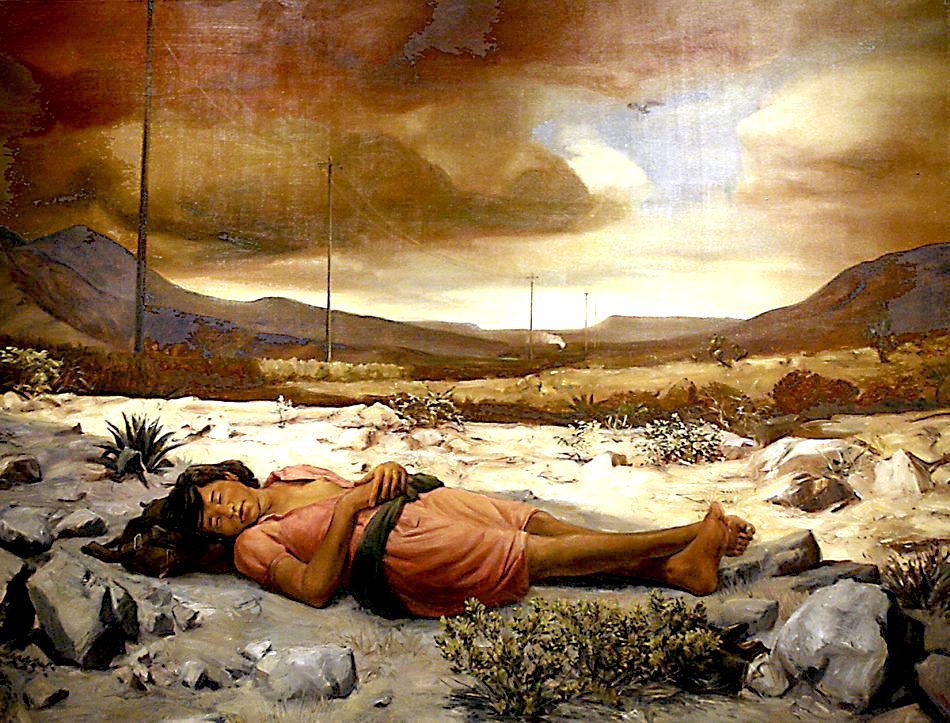Many countries with supposedly centre-left or left governments have joined the U.S. in proposals that seek to undermine Venezuelan democratic processes.

José Chávez Morado, Mexico, “Carnival in Huejotzingo,” 1939.
By Vijay Prashad
Tricontinental: Institute for Social Research
 On Aug. 16, the Organization of American States (OAS), whose 1948 formation as a Cold War institution was instigated by the United States, voted on a resolution regarding the Venezuelan presidential elections.
On Aug. 16, the Organization of American States (OAS), whose 1948 formation as a Cold War institution was instigated by the United States, voted on a resolution regarding the Venezuelan presidential elections.
The nub of the resolution proposed by the U.S. called upon Venezuela’s election authority, the National Electoral Council (CNE), to publish all the election details as soon as possible (including the actas, or voting records, at the local polling station level).
This resolution asks the CNE to go against Venezuela’s Organic Law on Electoral Processes (Ley Orgánica de Procesos Electorales or LOPE). Since the law does not call for the publication of these materials, doing so would be a violation of public law.
What the law does indicate is that the CNE must announce the results within 48 hours (article 146) and publish them within 30 days (article 155) and that the data from polling places (such as the actas) should be published in a tabular form (article 150).
It is pure irony that the resolution was voted upon in the Simón Bolívar room at the OAS headquarters in Washington, D.C.
Bolívar (1783–1830) liberated Venezuela and neighbouring territories from the Spanish Empire and sought to bring about a process of integration that would strengthen the region’s sovereignty. That is why the Bolivarian Republic of Venezuela pays tribute to his legacy in its name.
When Hugo Chávez won the presidency in 1998, he centred Bolívar in the country’s political life, seeking to further this legacy through initiatives such as the Bolivarian Alliance for the Peoples of Our Americas (ALBA) that would continue the journey to establish sovereignty in the country and region.
In 1829, Bolívar wrote, “The United States appears to be destined by providence to plague [Latin] America with misery in the name of liberty.” This misery, in our time, is exemplified by the U.S. attempt to suffocate Latin American countries through military coups or sanctions. In recent years, Bolivia, Cuba, Nicaragua and Venezuela have been at the epicentre of this “plague.” The OAS resolution is part of that suffocation.

Andry León, Venezuela, “José Gregorio Hernández,” 2023.
Bolivia, Honduras, Mexico and Saint Vincent and the Grenadines did not come to the vote (nor did Cuba, as it was expelled by the OAS in 1962, leading Fidel Castro to dub the organisation the “Ministry of Colonies of the United States,” or Nicaragua, which left the OAS in 2023).
Mexico’s President Andrés Manuel López Obrador, known as AMLO, described why his country decided not to appear at the OAS meeting and why it disagrees with the U.S.-proposed resolution, quoting from article 89, section X of the Mexican Constitution of 1917, which states that the president of Mexico must adhere to the principles of “non-intervention; peaceful settlement of disputes; [and] prohibiting the threat or use of force in international relations.”
To that end, AMLO said that Mexico will wait for the “competent authority of the country”’ to settle any disagreement. In Venezuela’s case, the Supreme Tribunal of Justice is the relevant authority, though this has not stopped the opposition from rejecting its legitimacy.
This opposition, which we have characterised as the far right of a special type, is committed to using any resource — including U.S. military intervention — to overthrow the Bolivarian process. AMLO’s reasonable position is along the grain of the United Nations Charter of 1945.
Many countries with apparently centre-left or left governments joined the U.S. in voting for this OAS resolution. Among them are Brazil, Chile and Colombia.
Chile, even though it has a president who admires Salvador Allende, who was killed in a U.S.-imposed coup in 1973, has displayed a foreign policy orientation on many issues, including both Venezuela and Ukraine, that aligns with the U.S. State Department.
Since 2016, at the invitation of the Chilean government, the country welcomed nearly half a million Venezuelan migrants, many of whom are undocumented and now face the threat of expulsion from an increasingly hostile environment in Chile.
It is almost as if the country’s president, Gabriel Boric, wants to see the situation in Venezuela change so that he can order the return of Venezuelans to their home country. This cynical attitude towards Chile’s enthusiasm for U.S. policy on Venezuela, however, does not explain the situation of Brazil and Colombia.

Pablo Kalaka, Chile, “Untitled,” 2022, sourced from Lendemains solidaires No. 2.
Our Tricontinental’s latest dossier, “To Confront Rising Neofascism, the Latin American Left Must Rediscover Itself,” analyses the current political landscape on the continent, beginning by interrogating the assumption that there has been a second “pink tide” or cycle of progressive governments in Latin America.
The first cycle, which was inaugurated with the 1998 election of Hugo Chávez in Venezuela and came to an end following the 2008 financial crisis and U.S. counter-offensive against the continent, “frontally challenged U.S. imperialism by advancing Latin American integration and geopolitical sovereignty,” while the second cycle, defined by a more centre-left orientation, “seems more fragile.”
This fragility is emblematic of the situation in both Brazil and Colombia, where the governments of Luiz Inácio “Lula” da Silva and Gustavo Petro, respectively, have not been able to exercise their full control over the permanent bureaucracies in the foreign ministries.
Neither the foreign minister of Brazil, Mauro Vieira, nor Colombia, Luis Gilberto Murillo, are men of the left or even of the centre left, and both have close ties to the U.S. as former ambassadors to the country.
It bears reflection that there are still over 10 U.S. military bases in Colombia, though this is not sufficient reason for the fragility of this second cycle.
In the dossier, Tricontinental offers seven explanations for this fragility:
-
the worldwide financial and environmental crises, which have created divisions among countries in the region about which path to follow;
-
the U.S. reassertion of control over the region, which it had lost during the first progressive wave, in particular to challenge what the U.S. sees as China’s entry into Latin American markets. This includes the region’s natural and labour resources;
-
the increasing uberisation of labour markets, which has created far more precarity for the working class and negatively impacted its capacity for mass organisation. This has resulted in a significant rolling back of workers’ rights and weakened working-class power;
-
the reconfiguration of social reproduction, which has become centred around public disinvestment in social welfare policies, thereby placing the responsibility for care in the private sphere and primarily overburdening women;
-
the U.S.’ increased military power in the region as its main instrument of domination in response to its declining economic power;
-
the fact that the region’s governments have been unable to take advantage of China’s economic influence and the opportunities it presents to drive a sovereign agenda and that China, which has emerged as Latin America’s primary trading partner, has not sought to directly challenge the U.S. agenda to secure hegemony over the continent;
-
divisions among progressive governments, which, alongside the ascension of neofascism in the Americas, impede the growth of a progressive regional agenda, including policies for continental integration akin to those proposed during the first progressive wave.
These factors, and others, have weakened the assertiveness of these governments and their ability to enact the shared Bolivarian dream of hemispheric sovereignty and partnership.

Antonia Caro, Colombia, “Colombia,” 1977.
One additional, but crucial, point is that the balance of class forces in societies such as Brazil and Colombia are not in favour of genuinely anti-imperialist politics.
Celebrated electoral occasions, such as the victories of Lula and Petro in 2022, are not built on a broad base of organised working-class support that then forces society to advance a genuinely transformative agenda for the people.
The coalitions that triumphed included centre-right forces that continue to wield social power and prevent these leaders, regardless of their own impeccable credentials, from exercising a free hand in governance. The weakness of these governments is one of the elements that allows for the growth of the far right of a special type.
As we argue in the dossier,
“The difficulty of building a political project of the left that can overcome the day-to-day problems of working-class existence has unmoored many of these progressive electoral projects from mass needs.”
The working classes, trapped in precarious occupations, need massive productive investments, driven by the state, premised on the exercise of sovereignty over each country and the region as a whole. The fact that a number of countries in the region have aligned with the U.S. to diminish Venezuela’s sovereignty shows that these fragile electoral projects possess little capacity to defend sovereignty.

Daniel Lezama, Mexico, “El sueño del 16 de Septiembre” or “The Dream of September 16th,” 2001.
In her poem “Quo Vadis,” the Mexican poet Carmen Boullosa reflects on the problematic nature of pledging allegiance to the U.S. government’s agenda. “Las balas que vuelan no tienen convicciones” (“flying bullets have no convictions”), she writes.
These “progressive” governments have no conviction regarding regime change operations or destabilisation efforts in other countries in the region. Much should be expected of them, but at the same time too much disappointment is unwarranted.
Vijay Prashad is an Indian historian, editor and journalist. He is a writing fellow and chief correspondent at Globetrotter. He is an editor of LeftWord Books and the director of Tricontinental: Institute for Social Research. He is a senior non-resident fellow at Chongyang Institute for Financial Studies, Renmin University of China. He has written more than 20 books, including The Darker Nations and The Poorer Nations. His latest books are Struggle Makes Us Human: Learning from Movements for Socialism and, with Noam Chomsky, The Withdrawal: Iraq, Libya, Afghanistan and the Fragility of U.S. Power.
This article is from Tricontinental: Institute for Social Research.
Views expressed in this article may or may not reflect those of Consortium News.

Vijay Prashad – You have simply outdone yourself with this collection of art work….I eagerly look forward to anything you write which I value not just for the new news you consistently articulately provide not found elsewhere but for the truly fabulous art that pulsates the “news” roundly vibrant with life! Thank you heartily!!!!!
Great historical outline and context from Vijay Prashad. Here at home, the purportedly “progressive” US Senator Sanders called Hugo Chavez a dead “communist dictator”. The “progressives” in the House, like AOC tell us we MUST vote for Genocide, or we are racist, misogynist supporters of DT. With the “far left” of US politics supporting war, genocide, and oligarchy, we don’t need no far right.
The Economic Siege Warfare (euphemistically called “sanctions”) against Venezuela, Afghanistan, Cuba, Syria etc. has resulted in the deaths and displacement of 100s of thousands. The US press ignore this, and use the economic meltdown of these countries to blame the victims. It’s not the siege warfare, it’s that evil Commie Dictator. Sadly, the “far left” in the US Congress vote for sanctions and genocide. Despite the staggering hypocrisy and lies, millions will go to the polls and vote for MORE war, more genocide, and more oligarchy.
Very cogent analysis of a depressing reality, thank you!!!
Wonder how many arms were twisted, how many empty promises given, how many backs stabbed to accomplish this. I don’t have the exact quote, but already during the times of Simon Bolivar…he warned about the Yanks. It is high time the world started imposing sanctions on the US – let them taste their own nefarious ‘medicine’.
My adopted country, Ecuador, moved away (somewhat) from the US in the Correa years and back to the US since. Unfortunately, while Ecuadorians seem happy enough with imported Chinese autos, there is a real sore spot in the Chinese development “aid.” They financed and built the largest hydro plant in the country–hydro being the primary source of electricity generation. It is supposed to supply nearly 30% of the power, but it is fraught with tremendous issues including bank erosion and excessive silt which can shut it down. And if that isn’t bad enough, the structure itself is full of cracks, we are told. International arbitration is supposed to take up the issue with the Chinese, but there is certainly no quick fix. Indeed, no long term fix has even been articulated at this point. Power outages are a real issue, and there’s nothing like a problem of this sort to sour Ecuadorians on Chinese infrastructure aid. Alas, back to the IMF we go for financing. A sad state of affairs all around. I wish they’d head into BRICS, but I don’t hear of anyone remotely interested.
There has never been a more evil and insidious empire than the current US one, why? because it runs on the false pretext of protecting freedom & democracy; other empires of old couldn’t dream of weaving such an elaborate web of bullshit, the US has, and it’s managed to fool billions of people.
It’s no different to the Star Wars story where Senator Palpatine masquerades as a force for good, fooling everyone but keeping his true identity hidden from the public eye. Life imitates art or is it the other way around?!
George Orwell’s 1984 shows how it works.
Huxley’s BRAVE NEW WORLD takes you through the one world order through the thoughts of the various characters.
When these books were written it was considered fiction. We are now living that not-so-fiction.
It’s not about democracy but the empire’s brutal need to conquer it’s so-called backyard!
Instead of ‘conquering their backyard’…spend the next 3-4 generations CLEANING IT UP the US backyard.
It matters who we vote for. When the candidate promotes more, higher taxes, wants to increase government spending, encourages more government control, this will make life even less livable.